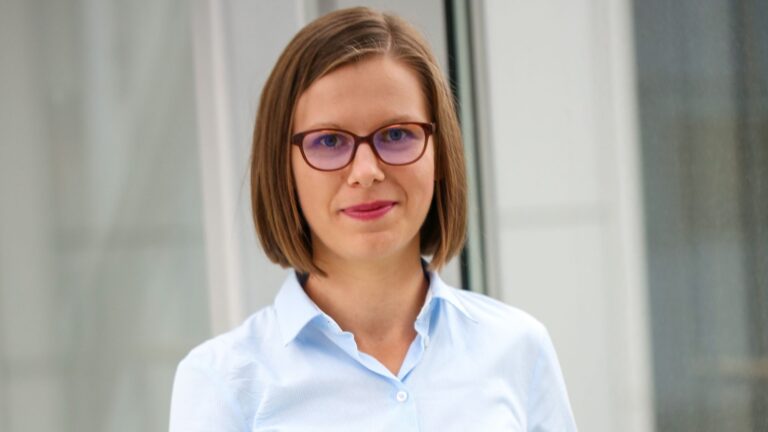We Did It In Poland: Real Research
A key product of Real Research is LifeGel, an innovative hydrogel that enables research in 3D conditions. It is what makes it possible to reproduce a more realistic cell environment, which significantly increases the reliability of results compared to traditional 2D cultures.
The innovation has found its breakthrough application in creating highly resistant pancreatic cancer models in laboratory cancer cell culture systems. This Polish solution opens up new perspectives for research into cancer therapies, offering hope for more personalized and effective treatments for patients in the future.
Real Research and LifeGel are symbols of the creativity and strength of Polish science that we write about as part of our We Did It In Poland campaign, which promotes homegrown innovations with global impact.
What conviction did you have to break within yourself to create something truly innovative?
Renata Krzykawska: Paradoxically – I didn’t have in my mind the thought that I was creating an “innovation”. And maybe that’s where the strength lies. Not in imposing pressure on myself: “now I’m going to invent something groundbreaking,” but in carefully observing reality and responding to real needs.
Innovations are born out of everyday challenges – both professional and personal. The key is to have the courage and strength at the right moment to move forward with this new solution, instead of hiding it in a drawer.
It was then that the need to break certain beliefs arose in me. No longer in the context of innovation, but of creating and running my own business. It was a step into the unknown for me, but also the beginning of something really special.
Was there a moment when you thought, “It won’t work”? What did you do then?
At Real Research, my team and I are conducting intensive research and development work that opens up new possibilities for our technology. These types of projects require a huge amount of money. There have been times when the financial situation is really difficult and thoughts of “this may not work” pop up in my head. At such moments I had to learn how to deal with the growing stress – so that it did not paralyze activities. Unfortunately, there is no universal solution to this – everyone has to find their own way. For me, the springboard is my children, family and reminding myself what is really important in life. Setting priorities anew gives distance. It allows me to look at professional problems as just another task to be done. Instead of stopping, I focus on finding solutions. Because even if a situation seems hopeless, I usually find that something can still be done about it.
What is your relationship with failure and success – are they paralyzing or have you learned to tame them?
Running a business is constantly experiencing both failures and successes. And it is up to us to focus on and learn from these experiences.
Over these almost 10 years of running Real Research, my perspective has changed. I am learning to learn from failures and to take joy from successes, even the smallest ones. Because they are the ones that build strength and give you the drive to complete more tasks. Sometimes you have to take three steps backward to take one forward – I have many such situations behind me.
A huge value on my path is also the fact that I create Real Research together with Marcin Krzykawski, who privately is my husband. We have full trust in each other – we know that we give our best. And even if something doesn’t go our way, we are sure that we couldn’t do better. This relationship gives me a lot of strength – both in difficult moments and when there is a success that we can celebrate together.
I admire women who build a business alone – it’s a huge responsibility and often a huge loneliness in decision-making.
Which skills – those “unmeasurable” – have proven to be the most important in building the company?
I believe that an extremely important quality is perseverance. If you start creating a plan B for yourself at the first difficulties, the company you build has little chance of survival. I see from myself how much commitment, sacrifice and dedication it costs me to build Real Research. That’s why I don’t believe you can be effective on many fronts – at least not when you are the founder and make all the key decisions, take responsibility for the team, the product, the vision.
Another important thing is the ability to stay focused on the goal. Even if the goal changes or the path to it evolves – the key is not to lose sight of it.
If you were to create a “survival manual for female innovators” – what would you put first in it?
I would definitely put faith in your innovation first. If you create something truly groundbreaking, it’s natural that no one else knows how to do it or how to effectively commercialize such a solution. Support from consultants, market analysis and observation of the competition can help, but ultimately you are responsible for the decisions – and you are the one who has to make them. That’s why perseverance and faith are so important, even if the road to success is unknown and full of question marks.
At Real Research, we heard many times that “it won’t work.” Early on, at one gas pedal, we heard from an expert that we had no chance of getting a patent for our LifeGel technology. Today we have a patent in 13 countries. I could cite many such stories.
Therefore: believe and move on.
And what’s one thing you should absolutely ignore when building something groundbreaking?
Tough question… But I guess what’s really worth ignoring are the opinions of people who don’t have the courage to try it themselves. Those who don’t understand innovation and try to bring you down just because they can’t rise above.
Imagine having no constraints – budget, technology, time – and being able to complete one crazy project. What would it be?
All my current activities are focused on oncology. And there is a project that particularly drives me. I dream of LifeGel being used in personalized medicine to test the effectiveness of cancer therapies for specific patients.
I want our technology to make a real difference in the health and lives of sick people – to be a bridge between science and hope. We have already tested this approach on colon cancer samples – the results are very promising, but implementing such a test on a wider scale is a huge challenge.
However, I believe that this is the future and one of the next important steps on Real Research’s innovative path.







